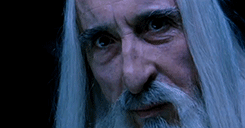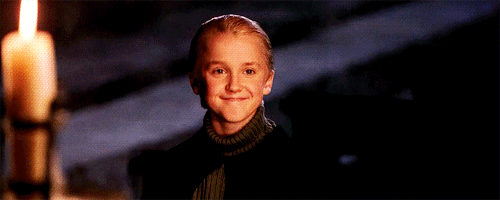Last week I talked about minor villains, and their ability
to be great, far greater than the majority of villains are these days*. A brief
review, if you missed out and/or don’t feel like reading said post:
Your minor villain is an Ally to the main villain. S/he
should be intelligent, terrifying, and easy to empathize with. They should
stand for something, and deserve their moment to shine.
Where did I come up with all this? If it’s just something
straight from my head, why not just discard it as my personal opinion of what a
minor villain should be?
I’ll give you three examples (so that if one of them spoils
something you haven’t seen/read, you can skip that one) of minor villains that
meet these criteria, and why they fit them.
The first example will be from Lord of the Rings (J.R.R. Tolkien), the second from Harry Potter (J.K. Rowling), and the
third from War and Peace (Leo
Tolstoy; this minor villain won’t really spoil anything, because once you know
if him you know he’s a minor villain. So if you haven’t read War and Peace, you
can probably still read that portion of this post.) I’ll alert you when the
spoilers for one starts, and when the next one starts. (Spoilers will be
throughout, but I’ll keep them to a minimum)
SPOILERS FOR LORD OF THE RINGS FROM THIS POINT FORWARD.
First Example: Saruman
Why?
Well let’s look at this fellow, using the six tips I
outlined last week:
1. He’s an Ally of the true villain. Few minor villains fit
this category like Saruman. He willingly (and I find that key) joins Sauron
2. We certainly do detest this fellow. In fact we thoroughly
hate him for several reasons. First, for his corruption of Theoden. Secondly,
his invasion and desolation of the beautiful land of Rohan and its peoples. Thirdly,
for his order to capture the Halflings of the Fellowship. Lastly (and perhaps
most importantly), we detest him for his ability to sway men with his words.
Everyone dislikes being manipulated, and Saruman is one of the best
manipulators around.
3. being empathetic toward Saruman takes a bit more work
than detesting him. In fact, empathy towards him may not even occur until the
very end of Return of the King, when
we see him broken, lost, and forced to travel with a much more despicable creature:
Wormtongue.
4. This one is more subtle than the rest, for Saruman.
Tolkien devoted more time on his story, and let things like themes, ideals, and
such, form by themselves. However, I do think Saruman means something,
something that can resonate strong for each person who reads about him.
5. Saruman stands on his own two feet excellently. Well,
more like he stands above his ten thousand orcs and palantir and orthanc and
mastery of wizardry. Regardless of what/where he’s standing, he does a good job
of it. Saruman is not just some pawn (even though he is), but he’s a terrifying
opponent on his own merit.
6. Finally, he’s intelligent. Moreover, he’s one of the most
powerful wizards in the history of Middle Earth. That alone makes the reader quake
in their shoes/slippers/socks/barefeet.
Altogether, when Saruman clashes with the heroes of LoTR,
the reading is holding their breath. And when the heroes win, we cheer all the
louder.
SPOILERS FOR HARRY POTTER FROM THIS POINT FORWARD
Second example: Draco Malfoy
Once again, we’ll just dissect this sniveling little boy
with my six points:
1. This one is, perhaps, the least true for Draco. He is
less of an Ally and more of a Slave. However, he still chooses to help
He-Who-Must-Not-Be-Named of his own desire.
2. Draco is good at making himself detestable. The way he
treats Potter, muggle-born, and magical creatures makes us hate him. And it’s
not just his scornful, bullying ways that help us grimace when we read about
him. His parents are made of the same arrogant material.
3. Flash forward from the first book, across the years of ‘GRRR
I THINK DRACO’S ANNOYING’ to the Half
Blood Prince. Draco’s joined the Dark Lord of his own free will and now he’s
paying for it. His parent’s failures have brought him to center stage as he’s
required to do something for the Dark Lord. At first, Draco is excited, but the
closer he gets to his objective, the worse Draco begins to appear. He’s
haggard, depressed, and moody. At one point he breaks down because a little
bird dies during his experiments. Even though we hate him, we feel this moment
strongly. Draco is broken. And somehow we hurt despite his annoying nature.
4. The Dark Lord’s Ideal, I think, is Hate. Draco’s is
similar, but he defines it in his own way. He follows after his leader, but is
strong on his own two feet.
5. Speaking of his own two feet, he certainly gets his
chance to do that. Draco is assigned his own mission, and refuses to let…
certain people… aid him. He wants to prove himself. And that’s scary.
6. Draco is a leader. His minions (Crabbe and Goyle) are
rather… dull-witted. But not he. Draco is clever, he’s well-trained, and
well-equipped. So when he reaches his objective, and we’re hanging by our
fingernails and hoping he won’t do this terrible thing, we’re terrified he
will.
SOME SPOILERS FOR WAR AND PEACE FROM THIS POINT FORWARD
Last example: Prince Anatole Kuragin
This ought to be quick:
1. He actually doesn’t fit the bill here at all. He’s not an
Ally of the main villain (France). He’s opposed to them all the way. However,
he still does a good job of hampering our heroes and heroines in his own way.
2. Anatole is despicable. He’s a greedy, arrogant, lustful
nobleman after his own aims, while all this time he flaunts his flaws as his
perfections. We also dislike him because of the way other minor characters seem
to flock to him, ignoring his flaws and acting as if he’s perfect.
3. Empathy for Anatole comes later in the story, when he’s
wounded in battle. And (*SPOILER*) he loses his leg from said wound. The way in
which he is suddenly rendered undesirable, bed-ridden, pitiful, and weak makes
us sorry for him.
4. Anatole carries his own theme with him to the very end,
and does it rather well. It’s a theme we all hate, but we all hate it because
we can identify with it in our own ways.
5. Anatole never does what he does because someone else
wants him to. Everything he does is for his own gain, for his own purpose, and
for himself. He stands for himself.
6. In his own way, Anatole is very intelligent. He knows
just how to charm in this way for that person, and that way for this person.
However blind he may be in some areas, Anatole sure knows what he knows, and
knows it well.
END OF SPOILERS
To wrap up, I’d like to ask you a question. Consider the
minor villains you love, and the ones you hate. And then ask yourself: Why?
What makes this minor villain such a great character? What makes this one a
weak character?
Once you know why, think of your own minor villains. What
makes them strong characters, and what makes them weak?
I was once told by a very wise friend [concerning theatre]
that a strong supporting cast can make a weak major role look strong.
And I think he was right. Even poorly written main
characters can begin to look better if they have good supporting cast. A weak
supporting cast is like a weak foundation: nothing can stand on it forever.
*these days
referring to a lot of villains from books and movies of the past decade.
I do not hold copyright to any GIFs, names, and titles presented herein.
Lord of the Rings, Harry Potter, and War and Peace are all property of their respective copyright holders and are used as descriptive examples only.



No comments:
Post a Comment